







































OnahNwachukwu Editor, THEWILL DOWNTOWN
Africa is experiencing change driven by young innovators making strides in business, technology, fashion, and other sectors. These youths are reshaping their respective industries and redefining Africa’s image on a global stage.
While the continent harnesses its vast potential, the young leaders emerge as key players in encouraging the development of innovation, driving economic growth, and promoting cultural heritage.






The technology industry sees African youths breaking barriers and leading digital transformations. They are developing technology that revolutionizes everything from financial services to education, positioning Africa as a promising tech hub.

The fashion industry is also experiencing a rebirth as young African designers gain global acclamation for their creativity. They combine traditional African aesthetics with modern trends to create masterpieces.
Young African entrepreneurs in business are creating solutions tailored to local challenges, attracting international investment.
Tomorrow is International Youth Day, so we pay homage to youths around Africa who are making great strides in different sectors, from business to fashion. Read our enlightening story about youths across Africa breaking barriers on pages 8 to 10.
Did you know that petite people should wear high-waisted trousers or skirts to give the illusion of a taller frame? We discuss this on our fashion pages. See pages 4 and 5.




Vitiligo affects people of all ages, genders, and ethnicities. Because of the disorder, people with vitiligo need to pay extra attention to their skin. On page 12, we share tips and skincare routines tailored to such people.
Don’t forget to click on the instructions below the QR code on page 16 to download our playlist. You’ll love the music selection.
Until next week, enjoy your read. OnahNwachukwu






SUNDAY, AUGUST 11, 2024



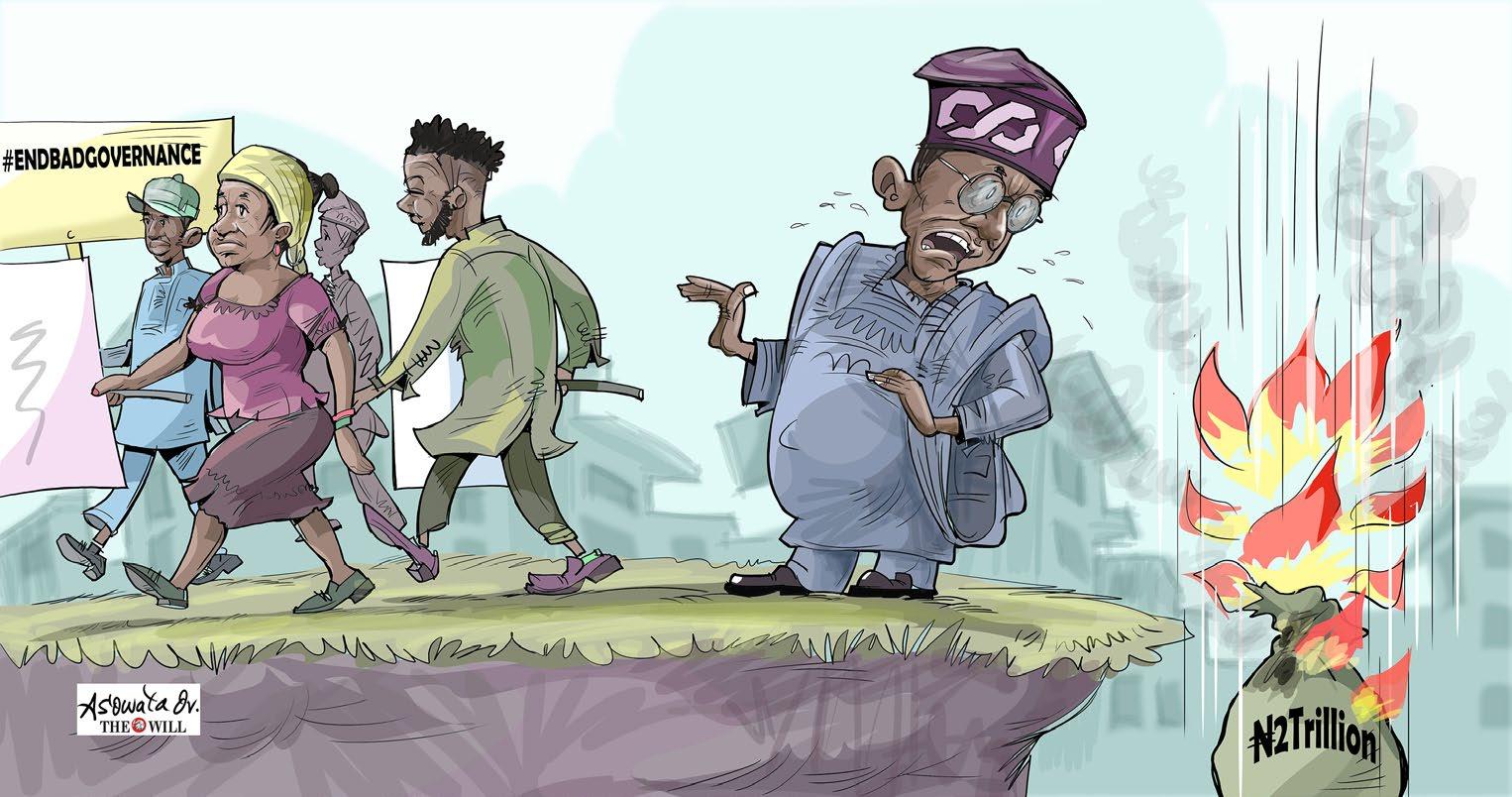
BY AMOS ESELE
As the organisers of the #EndBadGovernance protest refused to back down and pledged to enforce their rights to dissent by organising a one million man-march across the 36 states of the country and the FCT yesterday, a set of new stakeholders with no religious, traditional and partisan interest engaged the Federal Government in dialogue amid growing restiveness in the polity. These set of stakeholders are counting the cost of the riotous past 10 days and drawing lessons from them.
A group known as The Patriots, led by a former Secretary of the Commonwealth, Chief Emeka Anyaoku, met with President Bola Tinubu at State House, Presidential Villa in Abuja at the weekend and demanded the immediate constitution of a Constituent Assembly aimed at producing a people-oriented draft constitution. Earlier, a group of five good governance and democracy activists comprising political warhorses like Professor Jibrin Ibrahim, Clement Nwankwo, Professor Usman Bugaje, Kole Shettima, Ene Obi, Akilu Fatima, Uche Onyeagocha and Y.Z Yau had declared in a piece titled, ‘Nigeria at A Crossroads,’ that governance is collapsing as there is “a breakdown of public trust between the government and citizens” and unless government puts up policies that work, the country will crumble.
“That is the reality we are currently faced with, which is that no matter what the government expert is telling us, their policies must have a human face,” Dr Paul Alaje, Chief Economist and partner of SPM Professionals told THEWILL on Friday.
He said,“ I have advised this government that the current economic policy, petrol subsidy removal and floating of the Naira at the same time, can only break the back of our economy and I say this with all sense of responsibility. And you can check it out: Argentina implemented the same policy and it broke the back of their economy, the same thing happened with Venezuela. Even Russia did the same in the 1980s and 1990s until President Vladimir Putin came, put his feet down and benchmarked the Rouble against the US dollar.
“Ethiopia floated its currency recently. Call me back in nine months and let us see whether Ethiopia will not be among the poorest of the poor. It is a horrible policy. If you have a revenue challenge, do not take a shortcut; find revenue. And if you ask me whether we can find revenue, my answer is yes.”
Speaking on behalf of the group to State House correspondents after the meeting with the
President, Anyaoku who led other members of the group, namely former Ogun State governor, Segun Osoba, former Woman Affairs Minister, Paullen Tallen, former Adamawa governor, Bonnie Haruna, former Information Minister, Labaran Maku and Senator Shehu Sani, urged the Federal and state governments to engage the leaders of the protesters in dialogue. They also advised the security agencies to desist from using lethal weapons in the management of the crisis.
Dr Alaje, who maintained that he was painting a realistic picture of things rather than gloom by insisting that the way government was pursuing its current economic policies would further plunge the country into hardship, insisted that protesters were merely stating that the hope promised them during the campaigns were fading before their eyes.
“When promised hope becomes a fad, it makes the heart weak. So, when people who used to buy a loaf of bread for N800 found that it had suddenly jumped to N2,000 or the middle class that used to pay approximately N95,000 are now paying N150,000 for the same routes or those buying a sachet of ‘pure water’, for N5 now have to pay N50, it shows something missing in the conversation between government and the people, even if the policy is perceived to be good.”


For him, the cost of the 10-day protest in monetary terms stand at a little over N2 trillion based on the numbers SPM has been able to capture across the country, explaIning further that the amount does not deal with what would have been made in the past 10 days because the figure is a component of GDP and actually makes up roughly two percent of the GDP.
Speaking to THEWILL on Friday, Executive Director of Rule of Law, Accountability and Advocacy Centre, RULAAC, Okechukwu, Nwanguma, urged government to see the past 10 days of protest as an affirmation of “the fact that citizens have a right under a democratic dispensation to freely exercise their fundamental right to peaceful assembly, to peaceful protest and rallies to convey their dissatisfaction of policies and actions of government.”
On the part of the citizens, he said, “The citizens have been able to show that no force of arms can subdue the force of moral conviction. Government needs to listen to the voice of the people and engage in meaningful dialogue to resolve the dispute.”
Insisting that his twin policy of petrol subsidy removal and floating of the Naira was the best option to “reverse the decades of economic mismanagement,” as delivered in his nationwide broadcast on Sunday, August 4, 2024, President Tinubu, who had also called on organisers of the #EndBadGovernance protests to “suspend any further protest and create room for dialogue, which I have always acceded to at the slightest opportunity,” on Friday in the presence of the delegation from of The Patriots said, ”I am currently preoccupied with economic reform. That is my first priority. Once this is in place, as soon as possible, I will look at other options, including constitutional review as recommended by you and other options.”
Holding on to its position, the government directed its officials to launch an enlightenment campaign in the media and at the grassroots across the country.
Shortly after he ended his August 4 nationwide broadcast, the President’s aides on Public Engagement have sent its foot soldiers to the country's six-geo-political zones to spread the administration’s gospel on economic reforms.
According to The Head of Media, Presidential Community Engagement Office, Ms. Seun Ajayi, at the weekend, the six Senior Special Assistants to the President on Community Engagement namely Moremi Ojudu (South-West), Chioma Nweze (South-East), Gift Johnbull (South-South), Abiodun Essiet (North-Central), Abdullahi Yakasai (NorthWest) and Abdulhamid Abba (North-East) will begin to inform the grassroots about government policies, projects, and programmes.
According to her, the presidential aides “have been tasked with returning to their communities in the geo-political zones to engage directly with citizens.
“Their mission is to ensure that the President’s policies and programmes are well understood and that public feedback is actively incorporated into the government’s agenda.”
She explained that the whole idea is to strengthen the relationship between the government and its citizens and the newly established Presidential Community Engagement Office, a crucial bridge between the
Federal Government and local communities in Nigeria, is leading this initiative.
“As part of this effort, the office has introduced the Citizens’ Assembly, a nationwide programme designed to ensure that the voices of the people are heard and considered in national decision-making processes.
“This initiative aims to create a more inclusive and responsive government by facilitating meaningful engagements with the public.”
The Minister of Information and National Orientation, Muhammed Idris, has started making the media rounds, beginning with a team visit to ARISE TV in Ikoyi, Lagos last Thursday to sell the government’s twin policy and then TVC and Channels TV. At ARISE TV, the Minister argued that before the introduction of the floating of the Naira, the currency became “a product of speculation and this was not acceptable to the economy”.
For crude oil, Nigeria is currently producing 1.3 million barrels per day as against 2.1 million that is expected of our nation. Then the volume of gold and bitumen and other minerals are sources of revenue in hard currency available in Nigeria, which are largely unaccounted for. So, why is it easy to devalue our currency, remove fuel subsidies, but the government looks away from protecting its own assets, including the pipeline? The question is how are gold, bitumen oil exports recorded? We often hear that a military task force has destroyed hundreds of illegal refineries. How do these illegal refineries get their crude? Government is serious work
Idris disclosed that the government had already saved about N1.45 trillion from the removal of subsidy and the decision reduced the demand for petroleum by about 50 per cent.” His host and Chairman of THISDAY and ARIVE TV Media Group, Nduka Obaigbena, however, stated that although the removal of fuel subsidy was desirable, implementing the policy alongside the unification of the FX window at the same time overwhelmed the economy and submitted the government would communicate better to Nigerians with a lifestyle that is accountable and transparent.
The Patriots Nigeria during their visit told Tinubu that Nigeria needs a pluralistic constitution to tackle its development problems.
Urging the President to initiate an executive bill to be sent to the National Assembly for approval of the constituent assembly to be constituted, they said the outcome of the constituent assembly, which should consist of three persons each from the 36 states of the federation and the Federal Capital Territory, should be subjected to ratification by a referendum.
Dr Alaje emphasised the need to peg the Naira at N1,000 to the US dollar while the government moves to revamp the economy quickly. When reminded that when the Central Bank reportedly achieved that feat in April/May, 2024, it did so by foreign reserve financing, he declared there was nothing wrong in that as long as there was sufficient foreign reserve.
He said, “For crude oil, Nigeria is currently producing 1.3 million barrels per day as against 2.1 million that is expected of our nation. Then the volume of gold and bitumen and other minerals are sources of revenue in hard currency available in Nigeria, which are largely unaccounted for. So, why is it easy to devalue our currency, remove fuel subsidies, but the government looks away from protecting its own assets, including the pipeline? The question is how are gold, bitumen oil exports recorded? We often hear that a military task force has destroyed hundreds of illegal refineries. How do these illegal refineries get their crude? Government is serious work. If we don’t correct these illegalities and keep pushing the current policies, the economy will be broken. How long it will take is what I do not know.”
For the eight pro-democracy activists who penned “Democracy at a Crossroads,” three key policies need to be done to launch the country on the path of democratic governance. These are the strengthening of community policing to build trust through cooperation in society using indigenous knowledge and support through traditional institutions; Clean sweep of corruption through dealing with politically exposed persons because the high level of corruption is largely accountable for the prevailing hunger and poverty and broken system and lastly, tackling insecurity head on.
“As I have warned earlier, we should recognise that we are all sitting on a keg of gun powder if we fail to do the right thing. For instance, what the youth are demanding is very legitimate and they should be listened to. Why should they be denied what rightfully belongs to them? They are frustrated, they are hungry, they are angry, they are unemployed, and they deserve to be heard”, former President Olusegun Obasanjo alerted the nation during a visit of six House of Representatives members at his presidential library in Abeokuta on Friday.
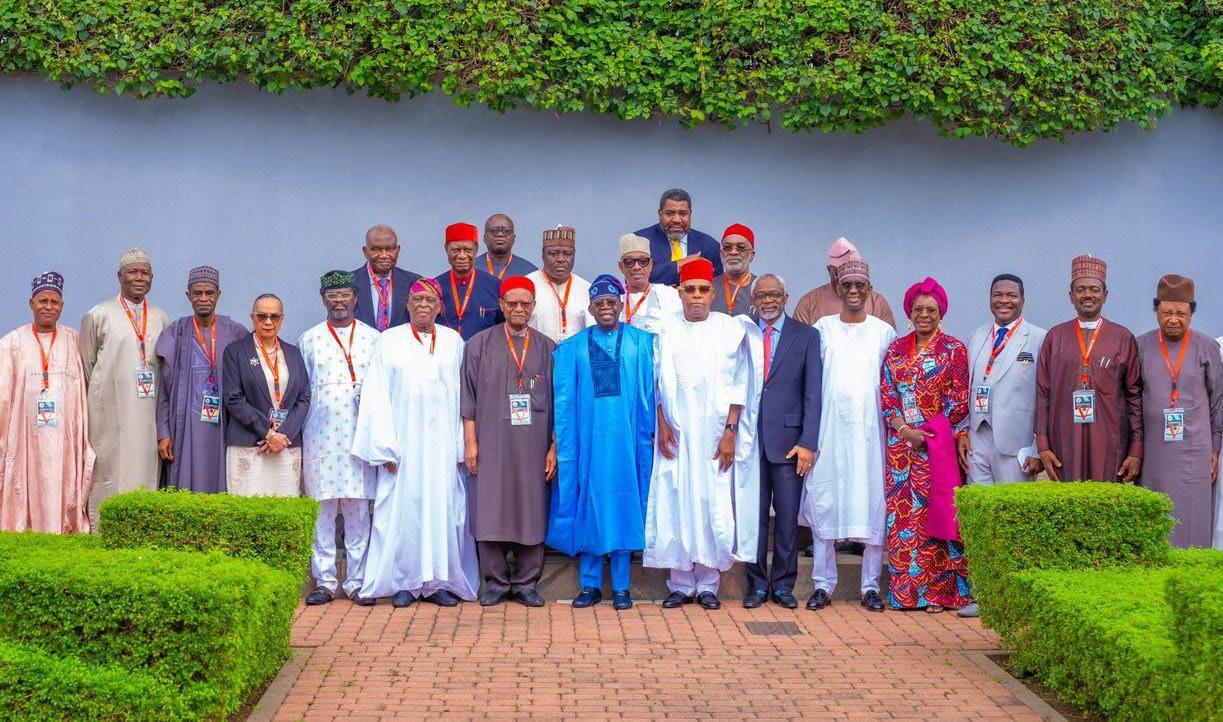
BY ANTHONY AWUNOR
The Chairman/Chief Executive Officer of Innoson Vehicle Manufacturing Company Ltd (IVM), Nnewi, Chief Dr Innocent Ifediaso Chukwuma, CON, has commended President Bola Tinubu for his recent Compressed Natural Gas (CNG) Initiative, which he said has many advantages over the current reliance of fossil fuels. Chief Chukwuma, who was optimistic that the various interventions of the President would stabilise the economy after some time, pleaded with Nigerians to be patient and wait for his initiatives to start yielding dividends.
The Innoson founder spoke shortly after a closed-door meeting with President Tinubu at the Presidential Villa in Abuja, on Thursday, August 8, saying he believed that the number one citizen would make the country better than he met it. Chief among the advantages of CNG-powered vehicles, according to Chukwuma, is cheaper prices, which will considerably drive down transportation costs.
“CNG is the best idea. The government’s initiative on CNG is the best idea for this country because there are a lot of benefits, and it is those benefits I saw before I started the factory to produce vehicles on CNG”, he said. Chukwuma also said that very soon, Nigerians would be seeing Innoson buses on the road in various parts of the country following the “fruitful discussions” with President Tinubu.
He added that “people must be patient. I know how this President behaves. Whatever we want, we will see the better side of Nigeria through his initiatives. I plead with everybody to calm down for him, because we will see a better Nigeria from Tinubu
Aformer member of the House of Representatives, Joan Onyemaechi (Joan Mrakpor), has regained freedom from her abductors.
Spokesperson of the Delta State Police Command, Bright Edafe, said the former lawmaker was released on Friday night. A family source also confirmed her release on Saturday to THEWILL.
Onyemaechi, who represented Aniocha/Oshimili Federal Constituency of Delta State in the House of Representatives, was abducted by gunmen who whisked her away on July 30, from her church premises along the DBS Road in Asaba.
Two persons, including her police orderly, were killed in the bloody operation. A former member of the Delta State House of Assembly, Onyemaechi, 58, is the immediate past Commissioner for Technical Education in the State.

“So, let Nigerians give him a chance because I believe that everything will be okay. The way I see him, he wants the best for this country. So, I am encouraging everyone to be patient and not destroy public infrastructure. There’s no benefit in destroying our things.”
Dr Chukwuma was optimistic that the meeting with the President would result in the patronage of IVM CNG vehicles by the Federal Government. “Yes, the government is doing its best with Innoson Vehicles,” he confirmed. “In a short while, everywhere you go you will see Innoson Motors.”
Dr Chukwuma also spoke on Innoson’s path-finder role in the production of CNG vehicles in Nigeria, saying, “I started CNG about two years ago. I was the first to start it in Nigeria. My visit here today is on CNG vehicle issues, I have discussed with him, and in a short time, the masses will start seeing CNG buses on the road.”
BY LADI DAPSON, MAIDUGURI
The Borno State Government has redeemed its pledged of N35.2 million gifts to El-Kanemi Warriors Football Club, following their historical outstanding performance in the 2024 men's President Federation Cup recently.
The Secretary to the State Government, Bukar Tijjani, made this known while presenting the cheque in Maiduguri on Friday, noting that in addition to the state government's cash gift, the club also received a N50 million cash prize for their victory.
He said the cash donation to the team was aimed at motivating the entire crew and players to achieve greater heights.
Bukar noted that as part of the N35.2 million package, each player received an N1 million stipend, a token of appreciation for their hard work and dedication.
The State Commissioner of Sports, Comrade Sainna Buba, expressed gratitude to Governor Zulum for the cash support and recommended Babagana Kalli as Special Adviser on Sports, citing his wealth of experience.
El Kanemi Technical Adviser, Aliyu Zubairu, acknowledged the state government's efforts in transforming sporting activities and appealed for the timely release of funds to facilitate players' travel to matches across the country.
BY KAJO MARTINS, MAKURDI
The Police Command in Benue State has confirmed the attack and killing of two police officers and fifteen people during invasion of Ayati community in Ukum local government area of the state by bandits.
This is just as governor Hyacinth Alia has expressed sadness over the unprovoked incident, describing it as barbaric and unnecessary.
According to Police source, normal daily activities where going on in the area when a large number of armed bandits invaded the village and started shooting sporadically at members of the community.
"Police officers within the community responded immediately and were able to repel the bandits and those who had ready sustained gunshot injuries from the attack were confirmed dead on arrival at the hospital.
The Police Public Relations Officer, SP Sewuese Anene, said the incident also claimed the lives of two police officers who were among the team that responded to the distress call.
According to the statement, corpses of victims have been deposited at the General Hospital at Ukum, while investigation is ongoing.
"The Commissioner of Police, CP Hassan Steve Yabanet, visited the Ayati community for an on-the-spot assessment of the situation. While commiserating with families of the deceased, he assured them of his commitment to fight criminals in the area." It added that the CP also commended officers for their response and encouraged them not to give up on the operation as more teams have been deployed to the area for wider coverage and better engagement of bandits.
Meanwhile, Benue State Governor, Rev. Fr Hyacinth Iormem Alia, expressed deep sadness over the news of another unprovoked attack on Ayati settlement.
Governor Alia strongly condemns the attack on unarmed innocent citizens of the State by armed bandits, expressing worry that such heinous act has continued in the state despite strong security presence and the regular dialogue sessions his administration has been holding with Stakeholders and traditional rulers seeking the return of peace in Sankera.
Chief Press Secretary to the Governor, Sir Tersoo Kula, in a statement, quoted his Principal as making a firm determination to continue to use lawful procedures to protect Benue people, particularly Ukum, which has been on the frontline of attacks lately.
Bola Tinubu (Right) welcoming the Chairman/CEO,

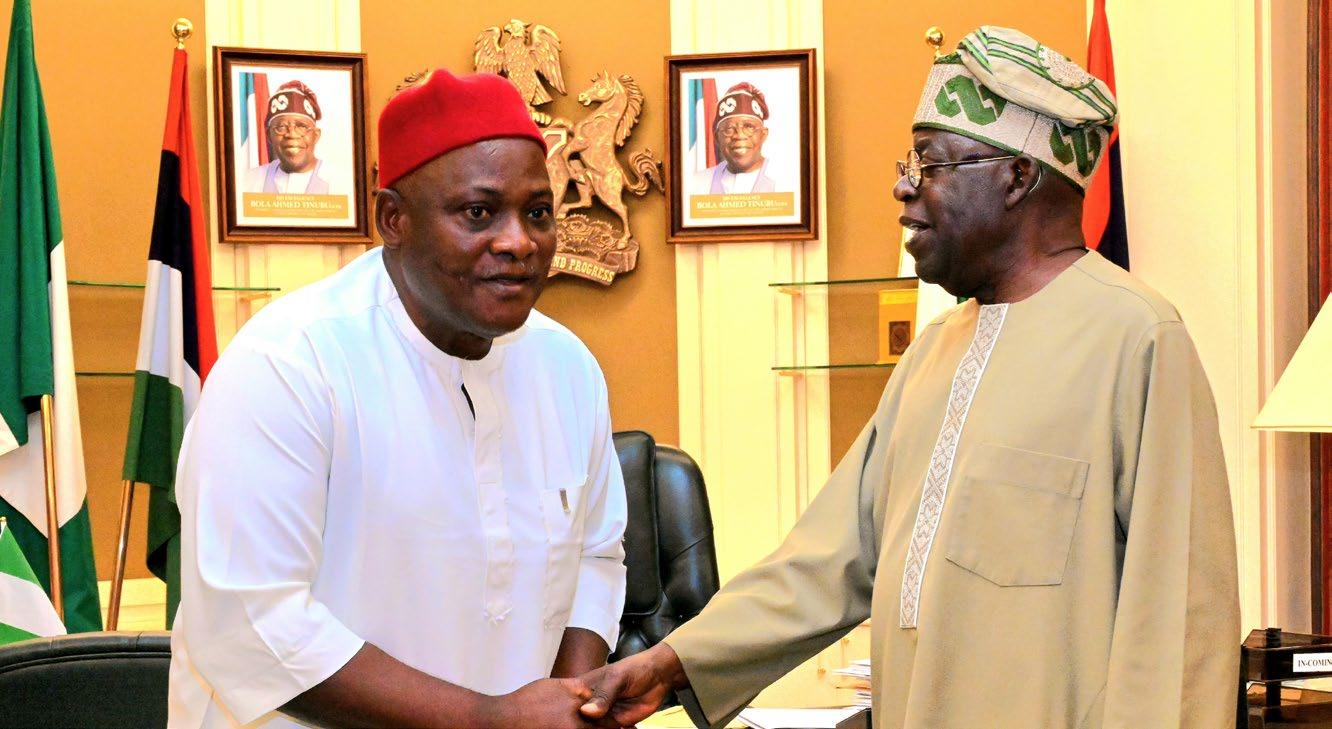
BY ABDULLAHI YUSUF
Foodstuff dealers at the Kwanar Singer Market In Kano have resolved to supply flour to the state branch of the Master Bakers Association of Nigeria at controlled prices so as to bring down the prices of bread in the state.
This was disclosed by the Chairman of the Singer Market Development Association, Barrister Mohammed Zakaria Junaidu, shortly after the meeting of members of the association with the Chairman of the State Public Complaints and Anti-corruption Commission, Muhuyi Magaji RiminGado.
Following the intervention of the State Government through the anti-corruption commission, Junaidu said, members of the association decided to sell flour to the bakers at N65,000 per bag,as against the prohibitive market price of N82,000 per bag.
He said the flour dealers had already released one truck load of the commodity to the Bakers Association at the controlled price, adding that another vehicle loaded with the commodity would soon be released to the bakers.
He blamed the high cost of flour in the state on the activities of middlemen whom he said, made the foodstuff virtually unaffordable to ordinary citizens.
The Chairman said the dealers would continue to supply flour to the bakers and other users of the commodity so as to beat down the prices of bread and other foods made from flour.
Earlier, the Chairman of the anti-corruption Commission, Muhuyi Rimin-Gado, told newsmen that the meeting with the dealers was in adherence to the directive of Governor Abba Kabir Yusuf to find ways of combating the new inflationary trend is in the state.
Rimin-Gado said the artificial inflation manifested immediately after the relaxation of the curfew imposed on the state following the recent anti-bad governance protests in the state.
He said the Commission would follow to the latter the resolution reached between the Kwanar Singer market dealers and commission to ensure that prices of commodities were brought down to enable the people of the state access them.
"The Commission is determined to combat the artificial inflation in the state and to fish out the perpetrators of the trend, so as to make foodstuff and other commodities affordable to our people", the Chairman said.

Police in Ogun State have arrested members of a kidnap syndicate in Ijebu-Igbo, for allegedly killing four persons and burying two in shallow graves after collecting ransom from the families of the victims. The suspects are Chukwuma Bathelomeu, 40; Igwe Monday, 42; Ifeanyi Mathias, 31; Anayo Simeon, 28; Ayo Adedayo, 46; Chibueze Odah, 41; Ejiofor Nwali, 35; Eke Peter, 22; Monday Paul, 24; Chukwuma Zainab, 37.
They were arrested on the crimes bordering on not only kidnapping, but also on conspiracy, murder, attempted murder and armed robbery. The State's Police Commissioner, CP Abiodun Alamutu, while parading the suspects on Friday, at the police headquarters Eleweran, identified a 17-year-old Elizabeth Adelaja Adeniran, as one of the victims killed by the abductors. Alamutu also mentioned others including Oluwaseun Oworu Samuel, Ogunyemi Femi and Oladokun Bolanle as victims murdered by the kidnapers after stealing their values and collected ransoms from their families. He said that the kidnapers, on July 28, 2023, shot and killed a Point Of Sale (POS) operator, Oluwaseun Oworu Samuel, and robbed him of his POS machine, Credit Cards, cash and other valuables and left him in a pool of his own blood, who later died at Babcock University Hospital.
The CP explained how the kidnapers, on October 2, 2023, stormed the house of one Adegbenga Adeniran at Ijebu-Igbo and abducted his teenage daughter, Elizabeth, to an unknown destination, and still collected the sum of N3,100,000 after killing her and dumping her corpse in a well. He explained further that the abductors on Nov, 23, 2023, kidnapped one Ogunyemi Femi at his residence in Ijebu-Igbo and whisked him away to an unknown destination where they recorded a video of him, sent it to his family and collected a sum of N3,000,000 as ransom through the deceased Oluwaseun's Moniepoint POS, they killed and buried him in a shallow grave. Alamutu also said that on March 12, 2024, the kidnappers stormed the resident of one Oladokun Matthew, at Awa Ijebu, robbed him of his belongings and abducted his wife, Bolanle, to an unknown destination, collected ransom, killed her and later buried her body in a shallow grave. He, however, said that the suspects would be charged to court for their crimes, while sounding a note of warning to other perpetrators of kidnap activities to desist from such as the police would not fold its arms and watch criminals wreck havoc on residents of the state.
Meanwhile, one of the the suspects, Chukwuma Bathelomeu, from Ebonyi State, while speaking in an interview, confessed that he got N200,000 as his own share after killing Femi from one Ifeanyi, a member of the gang whom he said has fled to Cotonou.
He said, "We went to Rob and kidnap Femi in his house at Ijebu-Ode around 9pm, because we heard he is a Yahoo boy. I took Cutlass and Ifeanyi took gun and we both went to Femi house to rob him. But he said he has no money we later kidnap him and took him to a bush where Ifeanyi killed Femi with his gun, and we buried him in a shallow grave.
The wife and two daughters of the Correspondent of Newtelegraph Newspaper in Kogi State, Muhammed Bashir, were among the ten members of the same family kidnapped on Thursday in Kaduna State. Bashir’s wife and her two daughters arrived Kaduna earlier on Thursday for a holiday in a suburb of Kaduna.
Bashir, a correspondent with the NewTelegraph Newspaper, disclosed this to colleagues on Friday in Lokoja, the Kogi State capital, in a terse statement. “My dear colleagues, please I need your prayers. My two daughters and their mother, including eight others, were kidnapped yesterday by unknown gunmen in Kaduna where they went for a holiday. Pls pray for me,” he wrote in the Kogi Correspondents’ Chapel WhatsApp platform. He noted that he had contacted the police and the Department of State Services, and had been assured that steps were being taken to rescue the victims and arrest the kidnappers.
BY FELIX IFIJEH
Aday after security operatives reportedly raided the headquarters of the Nigeria Labour Congress, Labour House and vandalised its library, another raid by security agents comprising agents of the Department of State Services (DSS) and police, laid siege to the office of the Committee for the Defence of Human Rights (CDHR) in Ikeja, Lagos State.
THEWILL earlier reported that the labour congress, in a statement issued by its Head of Media and Public Relations, Comrade Benson Upah, said Labour House was invaded by a mix of personnel from the Nigeria Police Force, the Department of State Services (DSS) and unidentified operatives dressed in plain clothes at about 8.30pm on Wednesday.
Upah said, “They broke in and ransacked the bookshop on the 2nd floor carting away hundreds of books and other publications. The invading troops claimed that they were looking for seditious materials used for the #EndBadGoveranance protests.”
However, DSS spokesperson, Dr. Peter Afunanya, said its personnel did not carry out any raid on the NLC office building.
“Kindly note that the Service (DSS) did not carry out any operation at the NLC office in Abuja,” Afunanya said in response to media inquiry.
On Thursday, security operatives surrounded the office at 43, Adeniyi Jones Avenue, off Oba Akran Avenue, Ikeja, ahead of a public symposium and candlelight procession scheduled for Friday, August 9.
The event, which is part of the #EndBadGovernance protests movement, aims to pay tribute to people who lost their lives due to poor governance in Nigeria.
Organisers had invited the public to join the solemn gathering. Attendees were requested to wear black mourning attire and bring candles.
Nigerians had on Thursday, August 1, hit the streets to protest what they tagged #EndBadGovernance in the country. However, the protest took a different dimension when protesters in the northern part of the country hoisting the Russian flag called for regime change.
President Bola Tinubu had summoned heads of security agencies and directed a crackdown on those threatening democracy in Nigeria.
The DSS and other security agencies have so far conducted a series of raids and arrested dozens of persons, including foreign nationals.
On Friday night, the Force Public Relations Officer, Muyiwa Adejobi said the raid was conducted by the police.
He said the NLC office was not the target of the operation.
“This well-coordinated, lawful operation was solely aimed at apprehending the prime suspect—a foreign national implicated in numerous criminal activities across Nigeria and other African countries,” he said, adding that, “we emphasise that this operation had no connection with the NLC, its secretariat, staff, or leadership. The NLC secretariat was not the focus of the operation, which was targeted at a rented shop within the building used by the suspect as a front for his criminal activities in Nigeria.
“The Nigeria Police Force seeks the cooperation and support of the NLC leadership as we continue this investigation, which is vital to safeguarding our nation. The high-profile nature of the suspect poses a significant security threat to Nigeria and other African nations, making this investigation crucial for the safety of all involved, including the NLC.”
The raid has attracted reactions from Nigerians and organisations, namely the governing All Progressibves Congress, APC, opposition Peoples Democratic Party, PDP, Labour Party, LP and the New Nigeria Peoples Party , NNPP, a Senior Advocate of Nigeria, SAN, and human rights activist, Femi Falana and the Conference of Nigeria Political Parties (CNPP).
“Hence, the State Security Service has denied its involvement in the invasion,” he said. “However, the official denial of the State Security Service in the repressive activity is not sufficient. “We are therefore compelled to call on the InspectorGeneral of Police to order an inquiry into the identities of the perpetrators of the illegal invasion. This should not be a case of unknown invaders!”
The CNPP said the raid was unwarranted raid, saying that this Gestapo-style operation, which involved forcefully gaining entry into the offices of the labour congress, is a blatant disregard for the principles of democracy and the rule of law.

“we emphasise that this operation had no connection with the NLC, its secretariat, staff, or leadership. The NLC secretariat was not the focus of the operation, which was targeted at a rented shop within the building used by the suspect as a front for his criminal activities in Nigeria
Falana said, “The invasion is a shameful reminder of the armed invasion of the NLC secretariat on February 28, 1988, following the loss of the post of the president of the congress at the triennial delegates conference of the congress by the stooge of the Ibrahim Babangida military junta.”
“As if the invasion was not enough, the reactionary forces in power at the material time proceeded to seize the secretariat and impose a sole administrator to manage the affairs of the congress for over a year.
“Two years earlier, security operatives had detained NLC leaders, including its president, Comrade Ali Chiroma, who died a few months ago.
“The Gestapo tactic on that tragic occasion was to forestall a nationwide protest in response to police killings of Ahmadu Bello University students.
“For genuine democrats, it’s utterly regrettable that official actions in a democratic dispensation could be reminiscent of the atrocities that defined the dark days of military dictatorship.” Falana said it is illegal for security forces to invade the homes and offices of law-abiding citizens and corporate bodies under a democratic dispensation.
According to the Deputy National publicity Secretary of the organisation, Comrade James Edema, “It is appalling that this incident occurred under the watch of President Bola Tinubu, who was produced through opposition struggle and has presented himself as a democrat over the years. The CNPP demands that President Tinubu immediately call to order the security agencies that are turning Nigeria into a police state, attacking opposition voices and hounding them into detention in a manner reminiscent of a draconian military junta.
He said that while the orgnisation was not advocating violent agitation, protests or distribution of inciting materials, it cannot accept the high-handedness of our security forces within civilian environments.
“At a time when farmers cannot farm in peace due to insecurity, the attempt to gag citizens or intimidate them into submission is unacceptable to a civilized society. This approach will only embolden the masses and earn more hatred for the Tinubu administration from people who are already undergoing unbearable economic pains and worsening hunger.
As the saying goes, "a hungry man is an angry man." We warn that if the Bola Tinubu Administration forgets that Mr President was a product of the trenches, it may be disastrous for the economy if security agencies push citizens underground through the ongoing highhandedness.
“We call on President Tinubu to respect the rights of citizens, including the NLC, and to focus on addressing the economic and security challenges facing the nation. The CNPP will continue to speak out against any form of oppression and advocate for the rights of Nigerians under a democratic and constitutional governance where the welfare of the citizens remains a top priority at all times.
On their part, the political parties toed predictable lines. While the APC called for restraint, saying it was too early to rush to a conclusion and start casting aspersions, the PDP, LP, and NNPP, slammed the act.
The PDP Deputy National Publicity Secretary, Ibrahim Abdullahi, condemned the act as a clear attempt to suppress organised labour
He said, “What happened yesterday is condemnable. As a party, we do not subscribe to that approach. Security agencies shouldn’t be deployed to go to institutions of the state, like the labour office, to ransack them and then suspect or blackmail them into sponsoring what you call a protest. Nigerians are entitled to their rights. Nigerians can see through them and through the government, and they have decided that they will go on the street.
“It is condemnable. As a party, we do not support it, and we see it as a further attempt to coerce the citizens and get them into silence. That is just the attempt or the decision of the APC.
For the LP, the act spells doom for democracy and rule of law. Its presidential campaign committee spokesperson, Yunusa Tanko, said, “No one needs to come into the NLC office in a commando style. These are people who are accessible to you. At any point in time, you can easily walk into the NLC office and issue them a warrant and say you suspect something is going on and you want to charge them if you find anything incriminating. So what is all this showmanship of barging into the NLC office unannounced and saying you are investigating some documents? These are respected union leaders, not criminals.”
The National Publicity Secretary of New Nigeria People’s Party, Ladipo Johnson, said the raid was a sad reminder of the dark days under the military regimes.
He said, “One begins to wonder whether they are going back to the military days. One begins to wonder about their propensity to tolerate constructive criticism or protests, which is an aspect of democracy for that matter. It would seem that from Mr President’s speech, he feels that the people do not understand. He hasn’t expressed that he will look again at some of his major policies that people believe have brought the economy to the stage it is at.”

As the first organisation that most travellers entering the country interact with officially, the Nigeria Immigration Service is more than an image maker. Its portfolio is so large that only a bad official will trifle with it. More so, when that official is of the rank of Assistant Superintendent of Immigration II, ASI. And the area of operation is one of the busiest international gateways to the country, the Murtala Muhammed International Airport, Lagos.
it undermines the ongoing reforms aimed at enhancing our service standards.” This disgraceful act, it said, is not representative of “our commitment to hospitality, reception, and courtesy.”
It went ahead to remind the public that electronic gates (e-gates) are being installed at all of the country’s international airports to facilitate smoother travel for all passengers, particularly Nigerians.
seeker, implementation of various treaties (bilateral, multilateral) entered into by Nigeria with other countries, anti-Human trafficking activities, border patrol and surveillance, recommendation of Non-Nigerians requiring citizenship or naturalisation to the Minister of Interior.

In this age of social media, the current video about Ufuoma’s action is not just damaging to the NIS but also to the citizenry, no thanks to the global perception index on corruption that ranks Nigeria 145 out of 180 countries and scores her 25 out of 100 points in the recently launched 2023 Corruption Perception Index, published by Transparency International Nigeria in January, 2024
So when an official, an ASI for that matter, was caught in a viral video titled “This is how Immigration officers treat tourists in Nigeria”, soliciting financial gratification from a traveller, it looked like similar videos that derided the NIS in the past. The saviour this time is that the NIS reacted swiftly by suspending the culprit identified in the video; ASI 2, Okpravero C. Ufuoma.
The traveller had unknowingly captured him, using camera-enabled eyeglasses, soliciting money while on duty. The NIS, in a statement on its X handle on Thursday, condemned Ufuoma’s alleged misconduct in very strong terms.
The statement, which was e-signed by the Comptroller General, Nigeria Immigration Service, K. N. Nandap, and dated August 7, acknowledged that the NIS received the video, identified the culprit, condemned his misconduct, which “does not reflect the values and ethics of professionalism upheld by the NIS, as
This measure, it claimed, aims to prevent incidents like the one involving Okpravero Ufuoma, who has been suspended indefinitely, pending the outcome of disciplinary procedures, which are in accordance with the law and Public Service Rules.
“The NIS reiterates its commitment to identifying and removing corrupt elements within its ranks, in line with our Zero-Tolerance for Corruption policy.” Indeed, the functions of the NIS, as earlier mentioned, are so large and reflective of the country’s image that it should no longer be treated with levity, either by its officials or the authorities.
For the avoidance of doubt, the NIS functions as spelt out in its books are governed by the Immigration Act, 1963, CAP II Laws of the Federation 2004 which include the control of entry into and departure from Nigeria and monitoring of non-Nigerians in the country, implementation of Nigeria’s extant visa regime, execution of deportation and repatriation orders, manning all the nation’s border posts (land, sea and air), issuance and control of all travel documents, determination of refugees and asylum
We hope the NIS boss will do as she has promised in the statement about Ufuoma; not just stopping the investigation and applying disciplinary measures but also carrying out a thorough overhaul of the now proverbial corrupt system that currently prevails in the place. There are many Ufuomas in the system. They need to be fished out and dealt with in the most indiscreet manner.
This is not the first time videos of such nature have surfaced in the past, though not under the current leadership. But, now that she has vowed to clean up the place, we urge her to do so without sentiment.
In this age of social media, the current video about Ufuoma’s action is not just damaging to the NIS but also to the citizenry, no thanks to the global perception index on corruption that ranks Nigeria 145 out of 180 countries and scores her 25 out of 100 points in the recently launched 2023 Corruption Perception Index, published by Transparency International Nigeria in January, 2024.
Finally, we urge the NIS to make the outcome of their investigation public. This will serve to whip personnel into line and send a message that an important organisation like the NIS is involved in getting rid of bad eggs in its ranks.



MUHAMMAD MUSTAPHA GAMBO
frica’s debt stocks have grown significantly in the past decade. Understandably, African governments took advantage of historically low interest rates in the 2010s and borrowed heavily
However, debt has recently become a lot more expensive. Since 2020, the impacts of the COVID-19 pandemic and the ongoing Russia-Ukraine war, coupled with worsening climate conditions have resulted in African governments having credit-rating downgrades, which consequently led to rapidly increasing their borrowing costs and made tapping international debt
According to data by the United Nations Conference on Trade and Development (UNCTAD), public debt in Africa reached USD 1.8 trillion in 2022. In 2024, African countries will pay $163 billion in external debt service, according to the African
One in five people globally live in countries that are in debt distress or at risk of it. Two-thirds of low-income countries – most of them in Africa –fall into this category, while eight of the nine countries currently in debt distress are on the continent, according to the United Nations Economic Commission for Africa (UNECA) 2023.
Some of the factors that have contributed to the mounting debt crises in Africa are population explosion and rapid urbanisation, massive infrastructure needs,
There has been a collective clamour by African Ministers of Finance, Planning and Economic Development for decisive action to reform the global financial architecture in light of the mounting
debts and to spur the investments needed for achieving sustainable development and climate goals around the world.
Pundits hold that the global financial system is structurally unfair to developing countries in general and more so to African countries in particular and that some crucial reforms are urgently needed to address the problem of Africa’s mounting debt stock.
According to the Italian Institute for International Political Studies (ISPI, 2020), offering African countries debt instruments with more favourable terms or cash, in exchange for existing debt, will not only provide immediate liquidity but also address debt sustainability concerns in the long term.
In the absence of better mechanisms for debt-distressed countries in Africa, more governments will struggle to service their obligations and limit their ability to invest in providing the necessary development needs of their countries. This is even more pertinent considering the need for enhanced effort in attending to the challenges of climate change in the region, through effective climate adaptation and mitigation measures.
Africa’s Multilateral Institutions
In the light of these challenges, there is a need for practical engagements anchored by African-led Development Finance Institutions (DFIs) such as the African Development Bank, to reform the global financial architecture and ensure a transition from multilateralism to a plurilateral system of the global financial system – one that is more nimble, more inclusive, more flexible and realistic in responding to the changing nature of challenges that African countries face today.
Aligned with these, there is also the critical role of sector-specific DFIs such as Shelter Afrique Development Bank and other relevant institutions that form part of the founding partners of the Alliance for African Multilateral Finance Institutions (AAMFI) – established under the auspices of the African Union, to support the implementation of Agenda-2063. Its formation underscores Africa’s commitment to self-reliance and sustainable economic development.
It’s believed that AAMFI, which is an alliance of African-owned and controlled African Multilateral Financial Institutions (AMFIs) whose membership also include African Trade and Investment Development Insurance (ATIDI), African Export-Import Bank, Trade and Development Bank Group, Africa Finance Corporation, African Reinsurance Corporation (Africa-Re), ZEP-RE (PTA Reinsurance Company), East African Development Bank (EADB), and the African Solidarity Fund (ASF) will address Africa’s development finance needs, advocate for Africa on global finance issues, develop innovative finance tools and support sustainable finance strategies.
AAMFI is in a pole position to lead the financial reforms on behalf of the continent. And as the adage goes, if you want to go fast, go alone. If you want to go far, go together.
BY KENNETH EMODI
Once hailed as the torchbearers of a new era in Nigerian music, Reekado Banks and Lil Kesh have seen their star power dwindle significantly. Their meteoric rise, characterised by charttopping hits and a massive fan base, promised an enduring legacy.
However, the trajectory of their careers has taken an unexpected turn, raising questions about the factors contributing to their decline.
Reekado Banks, with his smooth vocals and infectious melodies, with every young up-and-coming artiste wanting to be just like him, burst onto the scene as a protégé of Don Jazzy and Mavin Records. His early hits like "Caterpillar" and "Like" were anthems that resonated with a wide audience. He went on to steal the show and stamped his name by being the brain behind every chorus and hook during his time in Mavins, giving us the melodious “Adaobi”, “Looku Looku” and “Dorobucci”.
On the other hand, Lil Kesh brought raw energy and street credibility to the scene with tracks like "Shoki" and "Efejoku." Their music, while distinct, shared common thread: it was relatable, catchy, and aligned with the zeitgeist of the time.
The 2016 Headies Awards ceremony will forever be etched in the annals of Nigerian music history for a reason far removed from the actual award winners. The night was ignited by a clash of titans, a public display of rivalry between two of the industry’s most influential figures: Don Jazzy and Olamide. At the heart of the controversy was the ‘Next Rated’ award, a coveted prize given to the most promising new act of the year. The nominees, Lil Kesh from YBNL and Reekado Banks from Mavin Records, were both undeniably talented artists who had captured the nation’s attention.
The tension between the two camps had been simmering for some time, with both labels producing hit after hit and vying for industry dominance. The ‘Next Rated’ award became the catalyst for an explosive confrontation. When Reekado Banks was announced as the winner, a visibly upset Olamide stormed the stage, expressing his dissatisfaction with the decision. The ensuing verbal altercation between the two label bosses was a stark reminder of the fierce competition within the Nigerian music industry.
It’s important to acknowledge that the talents of both Lil Kesh and Reekado Banks were undeniable. They represented a new wave of Nigerian music, captivating audiences with their unique styles and infectious energy. The decision to award the ‘Next Rated’ to one over the other was undoubtedly a difficult one for the organisers. In retrospect, it’s a shame that such a prestigious award had to be overshadowed by a public dispute. Both artists deserved recognition for their contributions to the industry, and, unfortunately, their achievements were overshadowed by the controversy. Ultimately, the Headies’ showdown highlighted the intense rivalry between record labels and the pressure-cooker environment for young artists. While it was a dramatic moment, it also served as a reminder of the passion and dedication that drives the Nigerian music industry forward.
The decline of these once-dominant artists is a complex issue with multiple contributing factors. One of the most apparent reasons is the rapidly evolving music landscape. The Nigerian music industry is fiercely competitive, with new talents emerging at an unprecedented rate. Artists who fail to adapt to the changing trends and consumer preferences risk being left behind. Additionally, the saturation
of the market with a plethora of new sounds and genres has diluted the impact of established acts. Another critical factor is the challenge of maintaining consistency. While Reekado Banks and Lil Kesh enjoyed initial success, subsequent releases failed to replicate the magic of their early hits.
THE ROLE OF RECORD LABELS CANNOT BE OVERLOOKED. THE RELATIONSHIP BETWEEN AN ARTIST AND THEIR LABEL IS CRUCIAL TO CAREER LONGEVITY. ISSUES SUCH AS POOR MANAGEMENT, CREATIVE DIFFERENCES, AND FINANCIAL DISPUTES CAN HINDER AN ARTIST'S GROWTH

The pressure to deliver another chart-topper can be immense, and the quest for a new sound can sometimes lead to artistic experimentation that alienates the core fanbase. Furthermore, the fickle nature of the music industry means that even the most talented artists can experience periods of creative stagnation.
The role of record labels cannot be overlooked. The relationship between an artist and their label is crucial to career longevity. Issues such as poor management, creative differences, and financial disputes can hinder an artist's growth. While Mavin Records has consistently produced successful acts, the label's influence may have waned over time, affecting the careers of its former stars.
It is essential to note that the concept of "falling off" is subjective and relative. Reekado Banks and Lil Kesh may not have achieved the same level of commercial success as they did in their peak years, but they continue to release music and maintain a dedicated fanbase. Their impact on the Nigerian music industry is undeniable, and their contributions to the genre will be remembered.
Since parting ways with Mavin Records in 2018, Reekado Banks has been carving out his own path in the Nigerian music industry. While he hasn't achieved the same level of mainstream dominance as during his Mavin days, he has consistently released music and explored different sounds. He has dropped several singles and EPs, showcasing his versatility as an artist.
Reekado Banks has ventured into real estate, purchasing multiple properties, demonstrating his business acumen. Without the constraints of a major label, he has had more freedom to experiment with his sound and style. While his music might not have reached the same commercial heights as his earlier hits, Reekado Banks has maintained a loyal fanbase and continues to be a relevant figure in the Nigerian music scene.
226.5% to $15.80m in Q1 2024
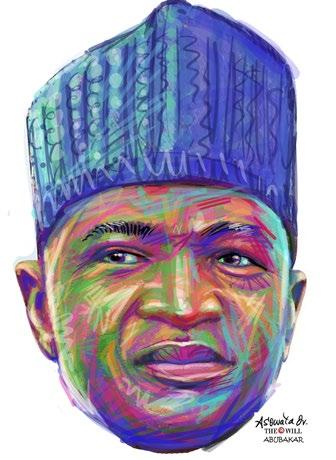
In a dramatic turn of events, Nigeria’s agricultural sector received an investment inflow totaling $15.80 million (year-on-year) in the first quarter of the year (Q1 2024), according to data from the National Bureau of Statistics (NBS).
This represents a 226.5 percent rise compared with $4,84 percent in Q1 2023 and a 3,490.4 percent surge against $0,42 recorded in the preceding quarter (Q4 2023).
Although it is indicative of moderate growth, the figure is a remarkable development compared with the previous periods Agric it did not achieve such performance. The sector recorded $10.01 and $4.64 investment inflows in Q2 2023 and Q3 2023 respectively while dragfooting in an economy where oil and gas and services play a greater role, The Nigerian government has maintained emphasis on agriculture as a means of diversifying the economy being the largest employer of labour, yet the sector has lagged in growth over the years.
This is shown in the GDP performance in recent times.
Nigeria’s agricultural sector has been on a continued decline in the past seven years – since 2017. This is not good news for the consumer goods firms who depend on the sector for local sourcing of their raw materials under the backward integration scheme.

According to data by the National Bureau of Statistics (NBS), aside from the second quarter (Q2) of 2016 when agriculture achieved a real gross domestic product (GDP) growth rate of 4.5 percent yearon-year, the sector has maintained an uninterrupted slide in the past seven years. The facts speak:
In Q2 2017, agriculture declined to a growth rate of 3.01 percent (from 4.5 percent in the corresponding period of the previous year), before it hit 1.19 percent in Q2 2018. The fortune of this strategic sector, which is the largest employer of labour, rose marginally to
Continues on page 15
EDITOR
Sam Diala
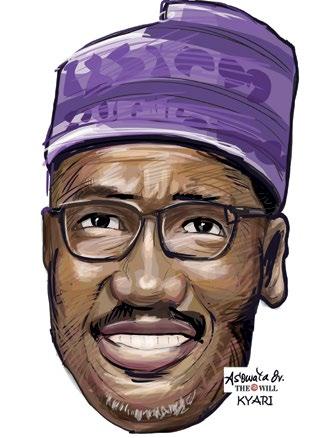
Ten months after the Senate embarked on a probe of the endless maintenance of Nigeria’s moribund refineries without a report, the upper and lower legislative chambers have jointly commenced a similar exercise.
Following fresh controversies trailing the nation’s oil and gas industry, especially in the aspects of sabotage, corruption and oil theft, the Speaker of the House of Representatives, Abbas Tajudeen, recently named a sevenmember committee to probe alleged economic sabotage in the oil and gas sector.
Surprisingly, this is coming on the heels of the action by the same Speaker who abruptly relieved the joint committee on Petroleum Resources Downstream and Midstream of the responsibility of a forensic probe into the sector amid allegations of massive fraudulent activities.
The recent panel headed by House Leader, Julius Ihonvbere, is to join the Senate in executing its task The House said the new structure aimed to ensure synergy between the two chambers of the National Assembly towards a holistic approach in addressing the issues involved.
On its part, the Senate has raised an Ad Hoc Committee to Investigate the Alleged Economic Sabotage in the Nigerian Petroleum Industry. The upper legislative chamber expressed concern over the $1.5 billion approved in 2021 for the turn-around maintenance of the Port Harcourt Refinery with little or no result.
Opeyemi Bamidele, Chairperson, Senate Ad Hoc Committee said it was unfair and wrong to treat public companies shabbily while private businesses were flourishing and thriving.
He recalled that the Federal Executive Council had approved the plan by the Ministry of Petroleum Resources to rehabilitate and turn around the Port Harcourt Refinery with $1.5 billion
Mr Bamidele expressed concern about the dysfunctional state of government-owned refineries despite billions of dollars spent on turn-
PETROL IMPORTATION 2016-2023

around maintenance.
“The federation is undergoing a truly challenging period. The distribution and supply of refined petroleum products have been irregular and problematic in the recent history of our fatherland. “The long queues at filling stations are a testament to this challenge.
“A situation whereby we now depend almost entirely on the importation of these products even when we daily supply the global oil market about two per cent of its crude oil requirements is worrisome,” he said. He also said that the importation of hazardous petroleum products and dumping of substandard diesel into the country was an issue of serious concern.
Mr Bamidele observed that the federal government, under different administrations since 1999, “has invested billions of dollars to maintain and turn around the state-owned refineries in Kaduna, Port Harcourt and Warri. But the refineries are not functioning.
“In 2021, specifically, the Federal Executive Council approved $1.5 billion for the turn-around maintenance of the Port Harcourt Refinery. Yet, this investment has not yielded significant returns.
“For us in the Senate, we believe it is unfair and unpatriotic to treat government or public corporations as an orphan while private businesses flourish and thrive.
Pending Senate Report
The same 10th Senate had on October 24, 2023, constituted an ad-hoc committee to investigate all contracts estimated at over N11.35 trillion awarded for the rehabilitation of the four moribund refineries in the country. This followed a motion by Senator Sunday Karimi (Kogi West) who averred that from 2010 till that date, the Nigerian government had spent N11.35 trillion on contracts to rehabilitate the four refineries, but they are still unproductive.
Continues on page 15

A situation whereby we now depend almost entirely on the importation of these products even when we daily supply the global oil market about two per cent of its crude oil requirements is worrisome
“Between 2010 to date Nigeria is estimated to have spent N11.35 trillion (N11, 349, 583, 186, 313.40) excluding other cost in other currencies which include $592, 976, 050.00 dollar, 4, 877, 068.47 Euros and 3, 455, 656.93 Pounds, on renovation of refineries, yet they are unproductive,” he said. In graphic details that elicited anger and disappointment, the lawmaker said:
“Despite the moribund state of the four refineries, the operating cost of these refineries between 2010 and 2020 is estimated at N4.8 trillion Naira. The refineries are estimated to make a cumulative loss of N1.64 trillion, within four years.
“Concerned that the Federal Government of Nigeria has carried out rehabilitation projects in Port Harcourt Refinery Company (PHRC) over a period of seven (7) years from 2013-2019 at an estimated cost of N12,161,237,811.61 only, in addition, on the 18th March 2021, a rehabilitation contract was executed between NNPC/PHRC and Tenenimont SPA at a Lump Sum of $1,397,000,000.00 only, about N75 billion naira amidst global public criticism. “Phase 1 of the Project is expected to be completed in 28 Months after the contract, Phase 2 within 24 months and Phase 3 within 44 months of execution. Despite this, the Port Harcourt “Refinery remains a money pit. Going by projections and representations from NNPCL the renovation works ought to be completed and operations of the Refinery commenced by June 2023.
“Perturbed that in a bid to revitalize the Warri Refinery, the Federal Government has injected huge Public funds into revamping Warri Refinery & Petrochemical Company limited to the tune of over N28, 219, 110, 067.10 between 2014 and 2019.”
The Senate, consequently, constituted a 7-member ad-hoc committee to investigate the matter and to submit their findings to the upper legislative chamber within four weeks – November 21. 2023. That was the end of the exercise. The recent decision by the Senate to investigate the worrying state of the oil industry , has added weight to concerns about the lawmakers’ indulgence in theatrical probes. Disappointment, Rage
Stakeholders and industry experts have expressed disappointment and furry over the Senate’s latest outing in legislative frivolities called probe. An oil and gas business practitioner, Engr Canice Benjamin, advised the lawmakers to settle down and enjoy their new SUVs cars gifted by the federal government instead of engaging in a “public, dance of shame”.
Engr Benjamin recalled that the Senate had engaged in countless probes of the oil and gas industry as well as the Nigerian National Petroleum Company Limited (NNPCL) without producing any concrete result that can be identified as problem-solving. He described the recent exercise as one that will end the way of the notorious Senate Niger Delta Development Commission (NDDC) probe.
Basket of probes
The Senate in May 2020 set up a seven-member ad-hoc committee to probe the “financial recklessness” of the Interim Management Committee (IMC) of the NDDC. The committee was specifically asked to probe the IMC for allegedly squandering N40 billion in three months and seek account for other financial transactions within this period. The acting Managing Director of NNDC, Prof Daniel Pondei, who collapsed before the television camera while appearing at the Senate in August 2020, was rushed out of the venue of the investigative hearing.
The then Minister of Niger Delta Affairs, Senator Godswill Akpabio, now Senate President, however, stayed behind for the probe, which was eventually suspended after the incident. Akpabio’s revelation that the lawmakers were part of the financial rot in NDDC stirred controversies that diverted attention from the purpose of the probe. The exercise died a natural death.
In another incident, the Senate on July 11, 2023 constituted an ad-hoc committee to investigate the fuel subsidy regime of the NNPCL. This followed the adoption of a motion by Patrick Chinwuba (Imo) during plenary.
*Continues online at www. thewillnews.com

The Nigeria Inter-Bank Settlement System (NIBSS) has reminded banks and other financial institutions to forward their customers’ account details to its Industry Customer Account Database (ICAD).
NIBSS disclosed this in a statement titled: “CBN’s directive: Submission of Customer Account Details to ICAD”
The NIBSS said the reminder was based on the apex bank’s directives to all commercial and microfinance banks and others in a circular with reference number BKS/DIR/ GEN/CIR/06/001 on January 2019.
Drawing attention to the directive, NIBSS said:
“The CBN released a circular with reference number BKS/DIR/GEN/CIR/06/001 on January 31 2019, directing all Deposit Money Banks, Microfinance Banks and Others to forward customers account details in specified format to the Nigeria Inter-Bank Settlement (NIBSS), with a view to maintaining an Industry Customer Account Database (ICAD).
“The highlights below is to reiterate and
1.79 percent in Q2 2019, then plunged to 1.58 percent in Q2 2020.
Although the overall GDP growth rate rose to 3.40 percent in Q2 2021 from -1.92 percent in the previous year’s equivalent period, the positive trend did not impact on agriculture: The sector, instead, nosedived to a 1.3 percent growth rate in Q2 of that year. It then sank deeper to 1.2 percent in Q2 2022, before recording a stunted growth of 1.50 percent in Q2 2023.
In all, while the overall contribution of agriculture to GDP hovered on the average of 23 percent during the seven-year period, the receding fortune of this sector was a major concern to the consumer goods firms. This is because the consumer goods firms rely significantly on agriculture to source their local raw materials under the backward integration policy.
Backward integration
Backward integration is a practice where companies are encouraged to cultivate their own raw materials by purchasing from their suppliers or establishing farms to grow produce for their factories. Though conceived in the 80’s, the policy gained momentum in the country following the crash in crude oil prices which started in the fourth quarter of 2014. The government put the scheme in place to save foreign exchange, create jobs, boost domestic productivity and grow the GDP. On a positive note, the initiative was well received in the real sector.
The consumer goods firms keyed into the scheme and have since taken giant strides in its implementation. This is to the benefit of the small and medium enterprises (SME), especially those engaged in the agriculture value chain and transport.
For instance, Nestlé Nigeria instituted a project to engage 5,000 smallholder farmers, initially, for the supply of raw materials for its agro-business operations. The initiative, ‘Developing Inclusive Grain Value Chains Project’, was in partnership with IDH — a Sustainable Trade Initiative and TechoServe outfit.
Nigerian Breweries stepped up local production of sorghum and cassava to boost local raw material supply for its plants. The 77-year-old consumer goods firm has made significant strides towards large-scale cultivation of sorghum and industrial application since the 80’s. Similarly, FrieslandCampina WAMCO Nigeria developed its local raw milk sourcing in a bid to support backward integration, an initiative that has proved a source of sustained income to almost 2,000 farmers (including 900 women).
In the same vein, manufacturers in the flour milling sector have been taking steps to increase their tempo of backward integration in recent times. Flour Mills of Nigeria Plc has invested in several farms and other agricultural projects to cultivate raw materials for most of its processes.
Industry giant, Cadbury Nigeria, established a cocoa processing plant in Ondo which has lifted many farmers and transporters engaged in the agribusiness value chain over time. Also, Guinness Nigeria Plc. launched its agriculture scheme tagged ‘Grow with Nigeria’ in 2018 for the growth of the agricultural value chain and that of small holder farmers who form an integral part of its business. The company has consistently sourced all its core ingredients such as sorghum and malt extract locally through the various local raw material chains up to 75 percent.
These partnerships enabled the consumer goods firms to develop an ecosystem of private sector players creating values that impact smallholder farmers directly and boosting employment.
With the strategic interventions, they are able to leverage on the collaboration as provided by the respective partners in the ecosystem. It has helped to improve the livelihoods of the farmers by moving them from subsistence level to full economic inclusion.
Downturn, dilemma
Incidentally, these projects have been negatively impacted by the receding fortune of agriculture occasioned by lingering structural supply-side challenges. These include rising insecurity, infrastructure deficits, inadequate storage facilities, logistical challenges, multiple taxes, extortion, amongst others. The projects are now severely challenged by the myriad of environmental obstacles across the states where the farms are established and the value chain is.
remind all stakeholders of the expectations of the CBN circular.
“All regulated financial institutions are mandated to push all their customers’ accounts/wallets to NIBSS’ ICAD within 24 hours of generating and assigning an account number to the customer (new or existing).
“This can be done using the ICAD API service or the ICAD portal. “All Tier-1 bank accounts and wallets records for individual accounts must be pushed to ICAD with Bank Verification Number, BVN and/or National Identification Number, NIN.
“All tiers two (2) and three (3) accounts and wallets for individual accounts must be pushed to ICAD with BVN and NIN.
“Where a potential customer does not have a BVN or NIN, the regulated financial institution may wish to; “For BVN, commence the process of enrolling the individual onto the BVN database.
“For NIN, advise the customer to visit the nearest NIN enrolment Centre. “The use of
any placeholder BVN or NIN or fictitious data on an account is strictly prohibited.”
Highlighted the benefits of carrying out the CBN’s directives, NIBSS said:
“It improves the industry Know Your Customer, KYC, process, industry data accuracy and integrity; “ It improves regulatory compliance and monitoring, promotes industry fraud detection and prevention; “It improves the Global Standing Instruction (GSI) service which supports loan recovery process.”
In view of the growing demand for more detailed information on bank accounts, for economic intelligence analysis, CBN had directed all the Deposit Money Banks (DMBs) to forward customers account details in a specified format to the Nigeria Inter-Bank Settlement System (NIBSS), with a view to maintaining an Industry Customer Account Database (ICAD).
The initiative contributed immensely towards improving the efficiency and safety of electronic payments in Nigeria.






Funmi Olotu, a former Senior Special Adviser on State Lotteries to the Governor of Lagos State, Babajide Sanwo-Olu, has been moved up the food chain, courtesy of President Bola Tinubu. Olotu has been appointed Programme Manager, National Social Safety-Net Coordinating Office, NASSCO. NASSCO, an

Barely a month after billionaire businessman and Chairman of BUA Group, Abdul Samad Rabiu, known for his philanthropic efforts through his Abdul Samad Rabiu Africa Initiative (ASR Africa) began the construction of a worldclass research laboratory at the Federal University Lokoja (FUL) in Kogi State, he has again initiated the construction of a publishing house for Babcock University. Continues on page 20




Damilola Otubanjo, an entrepreneur and a Senior Special Adviser to Governor Dapo Abiodun of Ogun State on Special Duties and Sustainable Development Goals, speaks with IVORY UKONU about her business brand, Milolar Signature, her involvement in politics, and sundry issues. Excerpts:
Howlong have you been running Milolar Signature?
Seven years now. I used to have three branches, but I shut down one of them for personal reasons and I do not intend to revive it.
How has it been these past seven years?
It has been a roller coaster. Sometimes you are excited, other times it is quite tough and crazy. Dealing with staff and people, inconsistency in the outcome of your work and ensuring that one is consistent with what one’s brand is known for - which is excellence - can be quite tough. Managing customers, situations and their complaints is a different ball game entirely. However, I have owned every aspect of my pain and struggles as they are mine entirely. But it has been worthwhile for me. I am grateful for the experiences and the struggles; they have made me a stronger person. They have made me more aware of who I am. I have had to reach deep from a place within me sometimes. So, it has been good.
What have you achieved so far since running the Milolar brand?
We have been able to cater to women across the country, even abroad. When you go to random places and people are able to identify your brand, not because of who you are, but because of what you do, then you know you are doing something right. So, to serve faceless people is a privilege because businesses these days have moved beyond the brick-and-mortar space. We now deal with people across the social media. Social media has really helped both small and medium businesses to thrive. It is also a fiercely competitive space in terms of being very innovative. You have to be right on the spot and you have to be very intentional with how you market your stuff. You have to be consistent to prove to people that you are not a brand that delivers a different thing from what you advertise to a point where your credibility is unquestionable. It has been a ride I must say.
What is your reason for expanding your business, if you believe businesses have moved beyond brick and mortar?
A physical store validates the brand, it legitimises it. I am not a faceless entity; people do not have to worry about buying from me because in case of any complaint they know where to have their concerns addressed. I am a politically exposed person. It means that I have to protect my integrity beyond the brand. I don't want to run an online brand. There is no way I can thrive without planting physical stores in more than one location.
How do you source your goods?
We produce everything in Nigeria - clothes, hair, skin care products - all made by me. I create the designs through sketches and I modify some of the designs so as to keep re-inventing and not remain in a rut and keep our customers bored. I am a very hands-on person and I believe that I have a lot of talents. I don't want to leave without exploring all of my potential. It is important that the recipe and quality of the brand is maintained and the essence of what I am doing does not get submerged. The whole idea is to have people consider our brand first before others.
You are also a politician. How is that aspect going for you?
So far so good. I am the Senior Special Assistant to the Ogun State Governor on Social Duties and Sustainable Development Goals. I ran for a seat in the House of Representatives in 2023 to represent Ijebu East/Ijebu North Federal Constituency, but I did not secure the seat but because of how strong my showing was before and during the election, I got the political appointment.
You aren't resting on your oars, I suppose. Do you plan to run again? Absolutely. I am a young person who believes that young people need to come into politics and not shy away from it. I mean if we want to see any significant improvement in the economy, then we need to be involved in governance. It is not just complaining about who is or who isn't qualified. There is an urgent need for youth participation because life is an ecological succession. Whoever is there now is going to wind down soon and if we do not step up, the baton goes to the next person who isn't
necessarily a youth.
You studied engineering, Physics to be precise. Why is an engineer, a fashion and beauty entrepreneur and a politician not practicing what she studied?
I did work with the Lagos State Government at some point. I was in charge of the Lagos solar project for a couple of years. So as an engineer, I actively thrived in the engineering space. But being deliberate in what I do, I knew that I would be in public service sooner or later. I needed to understand how civil service works, to understand the mindset of a civil servant. It eventually paid off and it has been a good experience. However, if I fold my hands and maintain my focus on only engineering or fashion, then I have not done my country any good. Besides, power appeals to me and I believe that I have what it takes to be in governance. I have the skills, the depth, the youthfulness, the interest, the qualification so I am more than qualified to be in politics. Interest precedes everything. There are so many people who are not qualified to be in politics, but they are interested in it and they run it anyway. So how can I acquire a degree in Physics, be a fashion enthusiast, be in the fashion business, be an entrepreneur generally and not wear a political hat? I believe I am competent and have multiple skills and that is why my interest in politics is piqued. I am not just testing the waters; I plan to remain politically relevant for many years to come. I am in business, not just because I am passionate about fashion, skin and hair care but also because one needs resources to drive one's political ambition. Something must have inspired your take on politics
Honestly, the passion comes from within. I do not have one person to attribute my political ambition to. It comes from a place of desire and I really, honestly believe that it is a calling for me. When I was running for the House of Representatives, I faced a lot of difficulty. I got stereotyped, I got judged, based on my gender, my youthfulness, the colour of my skin - it didn't reduce the desire in me. I have become more emboldened as nothing can stop me. also saw that I would be doing my state and country a major disservice if I do not do what I have been called to do because like I said, my interest in politics is a calling. The level of acceptance and progress that I have made on this political journey has made me understand that this is the right path to be on. I feel that I am doing what I am supposed to be doing. I am a mum, an entrepreneur and a politician. I just wear whatever hat needs to be worn at different times and I thrive at each of them.


Have you always wanted to be in fashion?
Yes. Back in Olabisi Onabanjo University, Ogun State, I had a fashion boutique. I do not just dabble into anything I do on the spur of the moment. There is always a thought process to it. I always knew that I would be in the fashion space because appearance matters to me. I am a very deliberate and intentional person. I am also a very visually inclined person and when I tried to describe what I wanted with some designers, and they were unable to key into what I wanted, I simply decided to do it myself and got people who bought into my vision to work for me.
When you are not busy working, how do you unwind?
I rest on the job because I love what I do. I try to spend time with my family and friends. My jobs can be very demanding and there is little or no time for entertainment.
What drives you?
I believe that my source is spiritual, internal. The Milolar brand is not just about fashion or skin or hair care, that is only a tip of the iceberg. I intend to play big in commodities, be a big investor etc. Long after I am gone, I want my name to keep resonating and to be a reference point to what a woman can do.


BY IVORY UKONU
Last weekend, the Olowu of Owu, Oba Saka Adelola Matemilola, Oluyalo Otileta VII hosted dignitaries from all walks of life to a grand 2-in-1 event: his 60th birthday party and his second-year coronation anniversary. The party, which held at the Olusegun Obasanjo Presidential Library Event Centre, Ogun State, was attended by prominent personalities, including several traditional rulers, such Oba Dr. Adedotun Aremu Gbadebo, CFR, Okukenu IV, the Alake and Paramount Ruler of Egbaland; Oba Prof. Adeyemi Obalanlege, the Olota of Ota, Awori Kingdom; Oba Dr. Adedapo Adewale Tejuoso, Karunwi III, the Osile Oke Ona Egba; Oba Adekunle Makama Oyelude, CON, Tegbosun III, the Olowu of Kuta and many others. Others who attended his party were former president Olusegun Obasanjo; Ogun State deputy governor, Engr. Noimot Salako Oyedele; former Ogun State governors, Senator Ibikunle Amosun and Otunba Gbenga Daniel; Ambassador Sarafa Tunji Isola; Senator Shuaib Salisu, etc.
Oba Matemilola had every reason to celebrate his second coronation anniversary as his emergence as king was not without controversy. After his selection, following the passing of Oba Adegboyega Dosunmu in December 2021, Matemilola was accused by two out of the seven ruling houses in Owu kingdom as not being an indigene of the community. A petition written against his appointment was sent to the Ogun State Government where he was described as a usurper who is a non-indigene but a Bonafide indigene of Ibadan in Ibadan Northeast Local Government of Oyo State. He eventually prevailed and he was crowned king in October 2022 as the 14th Olowu of Owu kingdom. One of the prominent members of the kingmakers who was part of the selection process was President Obasanjo who is the Balogun of Owu kingdom. An Engineer and human capacity developer, Matemilola has
Continued from page 18
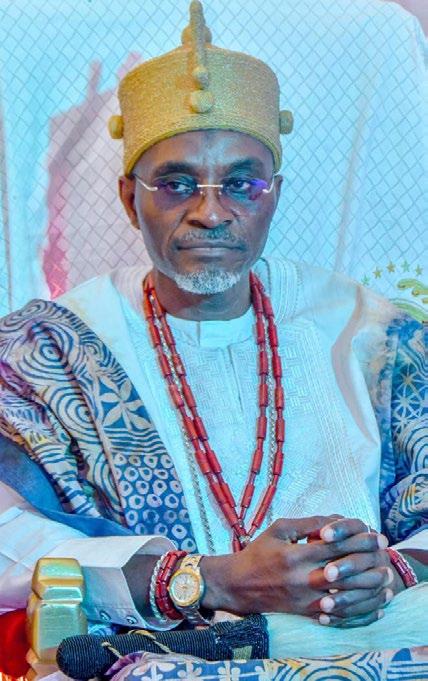
a Ph.D. in Applied Mathematics from the University of Cambridge, United Kingdom. Before his ascension to the throne, he was a Visiting Scholar at the Institute of Petroleum Studies, University of Port Harcourt, Rivers State. He sits on the board of various companies, such as Motus Technology Limited, City Roller Limited and Cypher Crescent Limited. He belongs to the Nigeria Society of Engineers and a Fellow of Cambridge Philosophical Society. He is also a distinguished member of the Society of Petroleum Engineers, Nigeria Council. As one of the influential sons of Owu kingdom, he has contributed immensely to the development of his community by providing water boreholes, monthly feeding allowance to the needy, dedicated financial support to healthcare, provision of school facilities and other philanthropic deeds.
Continued from page 18

agency under the Federal Ministry of Humanitarian Affairs, Disaster Management and Social Development is a Federal Government organisation with the mandate to establish the building blocks and delivery of targeted transfers and livelihood support to extreme poor and vulnerable households in Nigeria.
Olotu’s office will work in partnership with the World Bank and will play a vital role in strengthening Nigeria's social safety nets and protection systems. She will also be responsible for the design, development, implementation and management of all programmes, policy analysis, and advocacy; and provide guidance and leadership to the development and establishment of Social Safety Net delivery systems, while constantly interfacing with research and data. She will do these in conjunction with the heads of other agencies under the humanitarian ministry.

Estimated to cost N280 million ($175,000), the project will be named Abdul Samad Rabiu Integrated Publishing House for Babcock University when completed. The initiative aims to elevate the University from a basic press operation to a modern, integrated publishing house, encompassing publishing, print production, and diversified related services.
The one-storey building facility will serve as a laboratory and studio for training students of communications, media studies, and allied disciplines, as well as other fields. No doubt, the choice of the project aligns with the university’s vision to advance the Mass Communications Department to a new level and to produce graduates
capable of critical thinking and problem-solving, providing innovative solutions to social, political, and cultural challenges. Rabiu's interest in setting up a publishing house is to ensure the appropriate application of information which empowers society to overcome limitations and reach its full potential, particularly in this era of fake news. His commitment to supporting quality education within Nigeria’s tertiary education system is not lost on the public. Besides the educational sector, Samad through his ASR Africa equally prioritizes investments in healthcare, security and social development to drive sustainable change across Africa.
Olotu, who was one of the most influential special advisers to Governor Sanwo-Olu, began her career in the private sector, in the telecommunications industry precisely but nurtured the dream of building a career in public service and politics which has since come to fruition.
An associate member of the Institute of Directors, Nigeria (IoD) as well as an associate member of Women in Management, Business and Public Service (WIMBIZ), the 41-year-old was a one-time participant in the African Civic Engagement Academy which was supported by the US government in partnership with the University of Georgia.
ola Adesina, the Group Managing Director of Sahara Group, a leading energy and infrastructure conglomerate in Africa, will clock 60 on Monday August 12. To celebrate his landmark age, the entrepreneur who was a former Chairman of Egbin Power Plc and is currently the board chairman of Ikeja Electric plans to throw an exclusive party at Harbour Point Event Centre in Lagos. Guests are expected to turn up in ensembles that are a fusion of both cultural and contemporary fashion. Adesina started his career working in the insurance industry. Later, he moved to Sahara Group where he moved up the ladder as a result of his selling skills. His elevation at various levels within the group made him the leader of several projects, including the nationwide strategic management of the supply chain of Fuel to the
Emergency Power Plant of the defunct National Electricity Power Authority (now Power Holding Company Nigeria Limited, PHCN); the Majestic Oil delegation on the acquisition of the Sierra Leone Refinery. He also managed the Crude Oil contract of the Group in Côte d'Ivoire where he also served as the Director of Infrastructure, responsible for the acquisition of strategic assets in Africa. He served as a member of the Presidential Committee inaugurated by President Jonathan on the Accelerated Expansion of the Electricity Infrastructure in Nigeria, which culminated in the unbundling of PHCN successor companies. A recipient of several awards, Adesina led and steered the strategy that facilitated the acquisition of the Group’s power assets, the Ikeja Electric, the largest privately-owned power distribution business in Sub Saharan Africa, Egbin Power Plc – the largest thermal plant and First Independent Power Limited. Adesina leads the vision of Sahara Power Group aimed at bringing energy to life by deploying diversified power sources to light up lives, businesses and sustainable interventions in Nigeria and across over 38 countries in Africa where the Group has presence.




STORIES BY IVORY UKONU
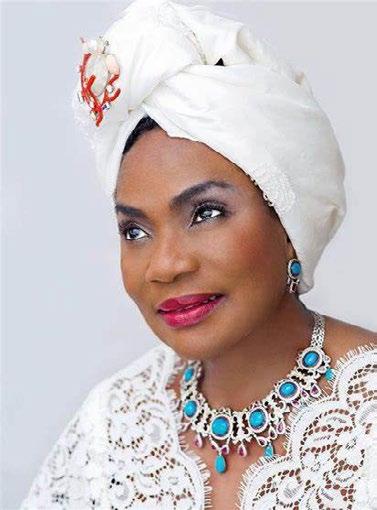
Late last month, the Senior Special Assistant to President Bola Tinubu on Community Engagement, North-East, Abdulhamid Yahya, otherwise known as Abdul Jazzy, tied the knot with his lover, Salma Sa'adina Dantata in a very elaborate northern/ Muslim wedding ceremony.


to Dr Dosunmu’s enduring legacy and contributions to the development of her community. The traditional aristocrat was installed the Erelu Kuti of Lagos, the highest female royal position in Lagos in 1974 by the late Oba Adeyinka Oyekan, the Oba of Lagos. She was only 27 years-old then. The Erelu Kuti of Lagos serves as a member of the kingmaker's council, Queen mother of Lagos, Regent to the throne when vacant, a close confidant of the traditional rulers in Lagos, a traditional ruler of women organisations, including market guilds, an adviser on social matters, conferment of traditional and honorary titles etc.
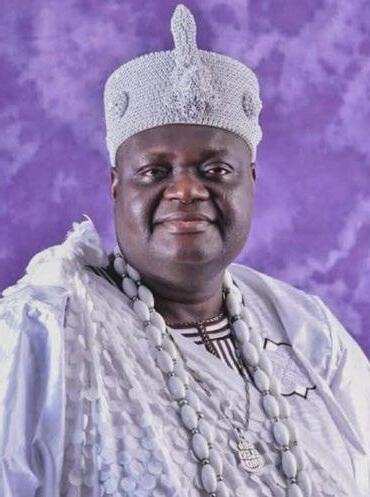
while they lauded him for a decade of leadership, resilience and community spirit. Formerly a businessman and pioneer Director-General of the Ghana-Nigeria Chamber of Commerce, Oba Ajayi ascended the throne in July 2014, after being unanimously chosen by the Arowotawaya ruling dynasty of Erinmo-Ijesha, Osun State, and accepted by the kingmakers as their new monarch. He was crowned by former governor Rauf Aregbesola. An erudite scholar with a vast array of awards and some Honorary PhD degrees, Oba Ajayi is a widely respected economic strategist.
The wedding which spanned a few days featured among other events, a Polo tournament in honour of the newlyweds at Kano Polo Club. The nuptials took place at the Alhassan Dantata Jumma'at mosque in Kano where many important northern personalities turned up to felicitate with the couple. The bride, Salma is the daughter of Alhaji Sa'adina Dantata the founder of Danba


the lasting impact she has had on loved ones. It was also an opportunity to reaffirm the values she instilled in her children.
Two days after, on Wednesday August 7, a funeral mass was held for her at St. Agnes Catholic Church, Maryland, Ikeja, Lagos. This solemn ceremony provided an opportunity for family, friends, and well-wishers to pay their final respects and honour the memory of the mother they all called blessed. Thereafter, she was committed to mother earth and guests were treated to a reception party. The Ogunlesi brothers used to be five, but
the oldest who was a medical doctor died many years back, leaving his four brothers behind. These four brothers who have done quite well for themselves have huge investments in properties and real estate business. While the first two, Olufolahan and Lanre are the most prominent of all the brothers, the other Kayode and Adegbola chose to live very quiet lives. In the days of yore, Olufolahan and Lanre ruled the Lagos social scene. They are very vibrant with lots of connections but these days, all seems quiet with the Ogunlesi brothers.
Group, a conglomerate which began as an indigenous firm in 1995 to operate initially, as a telecoms, chemical, and ICT hardware trading company, before diversifying its operations into a multi-sector organization to undertake comprehensive professional service in agriculture, manufacturing, multisector consultancy, oil and gas, power, import and export, construction, engineering, procurement, and general contracts. Despite being a member of the noble Dantata family in Kano state with an aristocratic background, the Danba boss is reportedly, humility personified. A lover of vintage cars he ironically detests an ostentatious lifestyle and tries as much as possible to stay off the limelight.
and Abdul Samad Rabiu with his $1.5 billion plant located in Kogi State. The cement plant among other things will produce 200 trucks of cement daily, create 10,000 direct jobs and hundreds of thousands of indirect jobs, which will in turn boost the local economy thus symbolizing a potential boom for Nigeria’s infrastructure development. Plans are already under way to launch the first bags of cement from the plant in Moba, Kogi State. The journey to establish the cement plant began in November 2021 when Mangal Industries partnered with Chinese firm, Sinoma. Despite an initial budget of $600 million, financial challenges, including a fluctuating naira, escalated the investment to $1.5 billion. However, Mangal’s determination pushed the project through, illustrating his resilience and dedication to industrial growth. Mangal is no stranger to entrepreneurship. Besides his venture into aviation, he has interests across transportation, textiles, agriculture, oil and gas, and construction via his conglomerate, ADFIN Group.
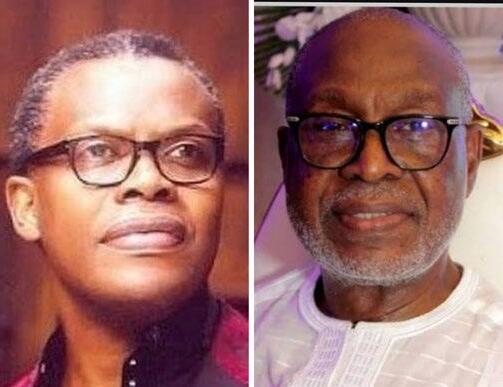
Photo Editor: Peace Udugba [08033050729]

L-R: Minister of State for Education, Dr Yusuf Sununu; Minister of Education, Prof. Tahir Mamman and the Director General, Industrial Training Fund (ITF), Dr Afiz Oluwatoyin Ogun, during a Stakeholders PreValidation Meeting on the National Policy on Skills Development, organized by the Federal Ministry of Education in collaboration with UNICEF and UNESCO in Abuja on August 6, 2024.

Minister of Creative Economy, Ms Hanatu Musawa (3rd right); member representing Andoni/Opobo/ Nkoro Federal Constituency of Rivers State, Rep. Awaji-Inombek Abiante (3rd left); Leader of the Rivers State delegation, the Amanyanabo of Opobo Kingdom, King Dandeson Douglas Jaja (2nd right), and other technical members, during the inauguration of the technical committee for the implementation of the King Jaja of Opobo’s Cultural and Historical Centre in Opobo, Rivers State, at the Minister’s office in Abuja on Augut 6, 2024.
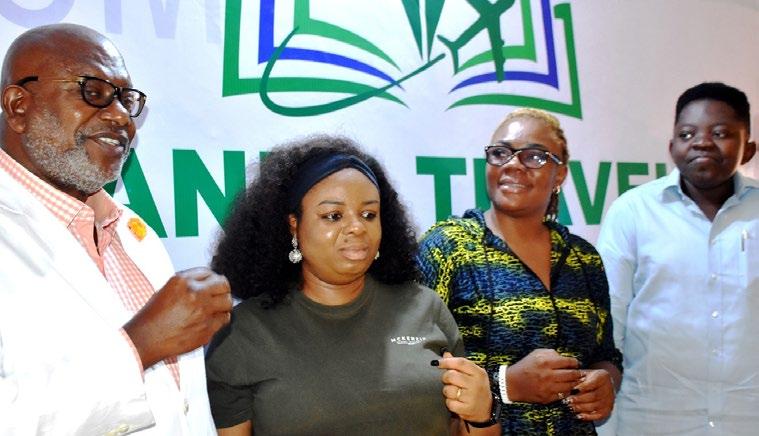
Project Coordinator, Jands Travels Network and Jands Business School (JTNTBS), Mr Okechukwu Okibe;
Mrs Ruth
Chief Executive Officer, JTNTBS, Mrs Chioma Obi and Media Consultant, Mr Nnaemeke Osemeke, during the inauguration of Committee on Domestic Tourism Workshop and Exposition for South-East Stakeholders in Enugu on Augut 5, 2024.

L-R: Comptroller-General of Customs, Bashir Adeniyi; Inspector General Of Police, Kayode Egbetokun; Chief of Naval Staff, Vice Admiral Emmanuel Ogalla; Chief of Defence Staff, Gen Christopher Musa and Chief of Army Staff, Lt-Gen Taoreed Lagbaja, briefing State House Correspondents after their meeting with President Bola Tinubu at the Presidential Villa in Abuja on August 5, 2024.
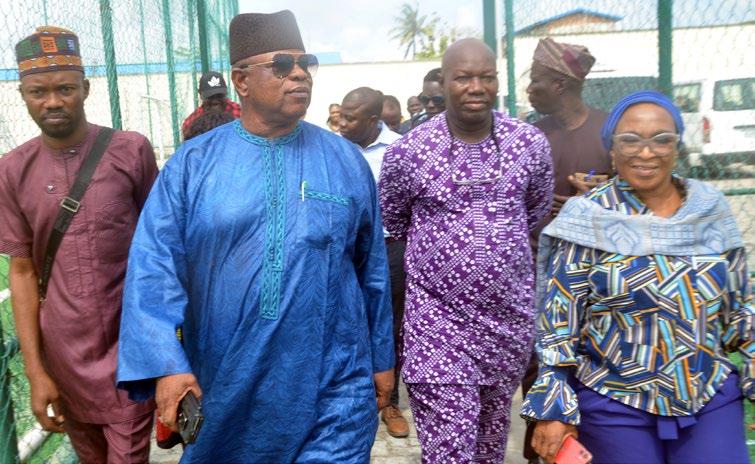
L-R: Supervisory Councilor, Information, Strategy and Communications, Ajeromi Ifelodun LGA, ApapaAjegunle, Valient Samson; Chairman of Ajeromi Ifelodun LGA, Fatai Ayoola; Coordinator, New Maracana Stadium, Dotun Coker and the Head of Editorial Operations, News Agency of Nigeria (NAN), Ifeyinwa Omowole, during the visit of NAN delegation to the Chairman’s office and the inspection of facilities at the Maracana Stadium built by Ayoola’s administration, in Lagos on August 6, 2024.

Social Affairs
and





BY JUDE OBAFEMI
The 2024 Paris Olympics have been a rollercoaster ride for Team Nigeria, with moments of brilliance overshadowed by a series of setbacks and unfulfilled expectations. The Games, set to conclude on August 11, have seen Nigerian athletes compete across various disciplines, but the overall performance has left much to be desired.

In athletics, Nigeria's performance has been a mix of promising starts and disappointing finishes
campaign has been the historic performance of the women's basketball team, D'Tigress. Led by coach Rena Wakama, the team became the first African squad, male or female, to reach the quarterfinals in basketball. This achievement is particularly noteworthy, given their underdog status and the formidable opponents they faced.
D'Tigress started their campaign with a stunning upset, defeating world number three ranked Australia. They followed this with a loss to hosts France before another impressive victory over fifth-ranked Canada, securing their spot in the knockout stages. Although they eventually fell to the incredible highest-ranked United States in the quarter-finals with a score of 88-74, their performance throughout the tournament was nothing short of remarkable.
of 44.73 seconds. While he did not medal, his performance was still impressive, particularly in a race where the winner, Quincy Hall of the USA, set a personal best of 43.40 seconds. Ogazi's rise to becoming one of the top eight 400m runners in the world signals a bright future for the young athlete and rekindled hopes of Nigerian success in this event.
However, these hopes were dashed in other events. Tobi Amusan, the world record holder in the women's 100m hurdles and a strong medal contender, failed to qualify for the final. Amusan finished third in her heat with a time of 12.55 seconds, placing ninth overall in the semi-finals. This result was particularly disappointing given her world-leading time of 12.40 seconds earlier in the year at the Jamaican Athletics Invitational.
In the women's long jump, Ese Brume, another medal hopeful, finished fifth in the final with a jump of 6.70 metres. While Brume's performance was commendable, it fell short of expectations, especially considering her African record and previous Olympic success.
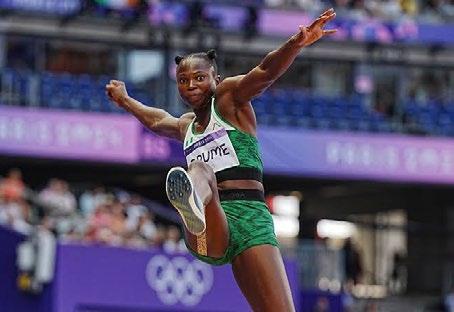
The team's success has not gone unnoticed. Their achievement has seen them climb four places in the global power rankings, a testament to their improved standing in international basketball. The likes of Promise Amukamara, Adaora Elonu, and Ezinne Kalu have become household names, inspiring a new generation of female basketball players across Africa.

In athletics, Nigeria's performance has been a mix of promising starts and disappointing finishes. Samuel Ogazi provided a rare bright spot in the men's 400 metres. The 18-year-old sprinter made history by becoming the first Nigerian in 36 years to reach the final of the 400m event at the Olympic Games, following in the footsteps of the legendary Innocent Egbunike. Ogazi's journey to this point has been remarkable, especially given his youth and relative inexperience compared to his competitors. His 2024 season saw him excel in the US college circuit, contribute to Nigeria's relay teams, and win a bronze medal at the African Championships.

The men's 4x400m relay team faced a heartbreaking disqualification. Emmanuel Ojeli, Ezekiel Nathanial, Dubem Amene, and Chidi Okezie had initially finished second in their heat with a time of 2:59.81, Nigeria's first sub-threeminute performance in 24 years. However, a lane infringement led to their disqualification, denying them a chance to compete for a medal in the final.
Nigeria's hopes in wrestling and taekwondo were quickly extinguished. In the women's 62kg wrestling category, Esther Omolayo Kolawole lost 5-1 to Kyrgyzstan's Aisuluu Tynybekova. The men's 125kg freestyle wrestling saw Ashton Adeyemi Mutuwa suffer a heavy 11-0 defeat to Hungary's Daniel Ligeti.
In taekwondo, Elizabeth Oluchi Anyanacho lost her second-round fight in the women's -67kg event. Anyanacho fell 2-0 (3-3, 8-3) to China's Jie Song, ending Nigeria's medal hopes in this discipline.
One of the more painful outcomes came from the women's football team, the Super Falcons, who had a tournament to forget. Despite high expectations following their impressive showing at the 2023 FIFA Women's World Cup, the team failed to progress past the group stages, losing all three of their matches.
In the final, Ogazi finished seventh with a time
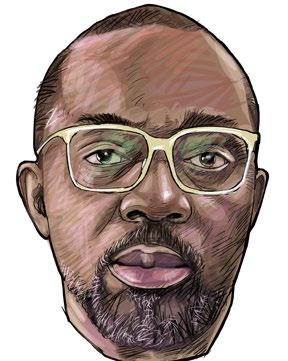

ogannah@thewillnews.com
The ongoing Paris 2024 Olympics has once again laid bare the chronic issues plaguing Nigerian sports administration. Despite a hefty N12 billion funding in preparation and participation, Team Nigeria finds itself in the unenviable position of being medal-less while nations of lesser economic and sporting stature celebrate their triumphs on the global stage.
The stark contrast between Nigeria's performance and that of its African counterparts is nothing short of embarrassing. As of the time of writing this piece, Kenya, occupying the 25th position with 2 gold, 1 silver, and 3 bronze medals, leads the continental charge. It is followed by Algeria (34th place, 2 gold), South Africa (1 gold, 2 silver, 2 bronze), Tunisia (1 gold, 1 silver, 1 bronze), Uganda (1 gold, 1 silver), Botswana (1 gold), even Zambia with a solitary bronze.
Meanwhile, Nigeria, a nation that prides itself on its sporting heritage, remains conspicuously absent from the medals table. This dismal showing is not merely a reflection of athletic underperformance but a damning indictment of the systemic failures within Nigerian sports governance. The recent debacles involving sprinter Favour Ofili and cyclist Ese Ukpeseraye serve as glaring examples of administrative incompetence that directly impacts our athletes' ability to compete at the highest level.
In my article last week, I lampooned senior officials of the Nigerian Olympic Committee (NOC) and Athletics Federation of Nigeria (AFN) over Ofili, a promising sprinter, who was inexplicably left off the entry list for the women's 100m event. This administrative oversight not only robbed her of a chance to compete but also dealt a severe blow to her morale. The emotional toll of such negligence cannot be overstated, with reports of Ofili breaking down in tears after realising she could not participate in her event. This incident is not an isolated case but a symptom of a larger problem of inefficiency and lack of attention to detail within Nigerian sports administration.
Perhaps even more alarming is the case of Ukpeseraye, Nigeria's first-ever Olympic cyclist. Ukpeseraye found herself in the embarrassing position of having to borrow a bicycle from the German team to compete in her track events. The explanation offered by Sports Minister John Owan Enoh – that the invitation to participate in these events came at the last minute – rings hollow. It is the very job of sports administrators to anticipate and prepare for such contingencies. The failure to provide an athlete with the most basic equipment needed for competition is a damning indictment of the lack of professionalism and foresight within Nigerian sports governance.
These incidents point to a larger pattern of mismanagement and lack of accountability that has not only plagued Nigerian sports for decades but the entire bureaucracy. The recurring nature of these issues suggests that there are no real consequences for those responsible for these failures. Year after year, Olympics after Olympics, we witness the same stories of administrative incompetence, yet the same individuals remain in positions of power within our sports bodies.
The blame for this state of affairs must be laid squarely
at the feet of the Nigerian sports administration, from the Ministry of Sports down to the various sports federations. The Cycling Federation of Nigeria (CFN), in particular, must be held accountable for its failure to adequately equip and prepare its athletes for the Olympic Games. The fact that Ukpeseraye had to rely on the goodwill of a foreign team to compete is a national

embarrassment that should prompt immediate action. Moreover, the Sports Ministry's role in this fiasco cannot be overlooked. Minister Enoh's explanation that it would take months to procure the required bicycle for Ukpeseraye's track events is unacceptable. Olympic preparation is not a last-minute endeavour. It requires years of planning, foresight, and proactive management. The Minister's statement only serves to highlight the reactive, rather than proactive approach that seems to characterise everything about our government.
The systemic nature of these failures point to deeper issues within Nigerian sports governance. There appears to be a lack of clear lines of responsibility, poor communication between various sports bodies, and an absence of robust systems to handle the complexities of international sporting events. The fact that similar issues continue to recur suggests that there is little to no
institutional learning from past mistakes. It is high time for a comprehensive overhaul of Nigerian sports administration. This should include a thorough audit of all sports federations to identify areas of inefficiency and mismanagement. The implementation of strict accountability measures, with clear consequences for administrative failures, is crucial. We need the development of comprehensive contingency plans for all possible scenarios in international competitions. Furthermore, there must be investment in modern sports management systems and technologies to streamline administrative processes. Regular training and capacity building for sports administrators to ensure they are up to date with international best practices is essential. The establishment of an independent oversight body to monitor the performance of sports federations and hold them accountable is long overdue. Finally, a transparent and merit-based system for appointing individuals to key positions within sports administration must be put in place.
The continued shabby treatment of our athletes not only hampers their performance but also discourages young talents from pursuing careers in sports. We have already seen the consequences of this mismanagement, with promising athletes wishing to represent Nigeria not getting feedback for their requests to be sponsored to athletes like Annette Echikunwoke choosing to represent other countries due to the administrative failures of Nigerian sports bodies.
Echikunwoke's story is particularly poignant. After being disqualified from the Tokyo Olympics due to administrative errors by Nigerian officials, she fell into depression. Her subsequent decision to switch allegiance to the United States has now resulted in an Olympic silver medal - a medal that could have been Nigeria's had our sports administration been more competent and supportive.
The loss of talents like Echikunwoke, Yemisi Ogunleye (who won gold for Germany in the women's Shot Put) and Salwa Eid Naser (formerly Ebelechukwu Agbapuonwu, now an Olympic silver medallist for Bahrain) should serve as a wake-up call. These athletes, all of Nigerian origin, are achieving Olympic glory for other nations while Nigeria struggles to make its mark on the global stage.
The Nigerian people deserve better from their sports administrators and government at all levels. Our athletes, who dedicate their lives to representing our nation, deserve better support and preparation. The government must take immediate and decisive action to address these systemic failures in our sports governance.
If we continue on this path of mediocrity and mismanagement, we risk not only continued embarrassment on the international stage but also the loss of an entire generation of sporting talent. The consequences of inaction are too severe to ignore. It is time for accountability, reform, and a renewed commitment to excellence in Nigerian sports administration. Anything less is a disservice to our athletes and to the nation as a whole.
The Nigerian people deserve better from their sports administrators and government at all levels. Our athletes, who dedicate their lives to representing our
nation, deserve better support and preparation. The government must take immediate and decisive action to address these systemic failures in our sports governance